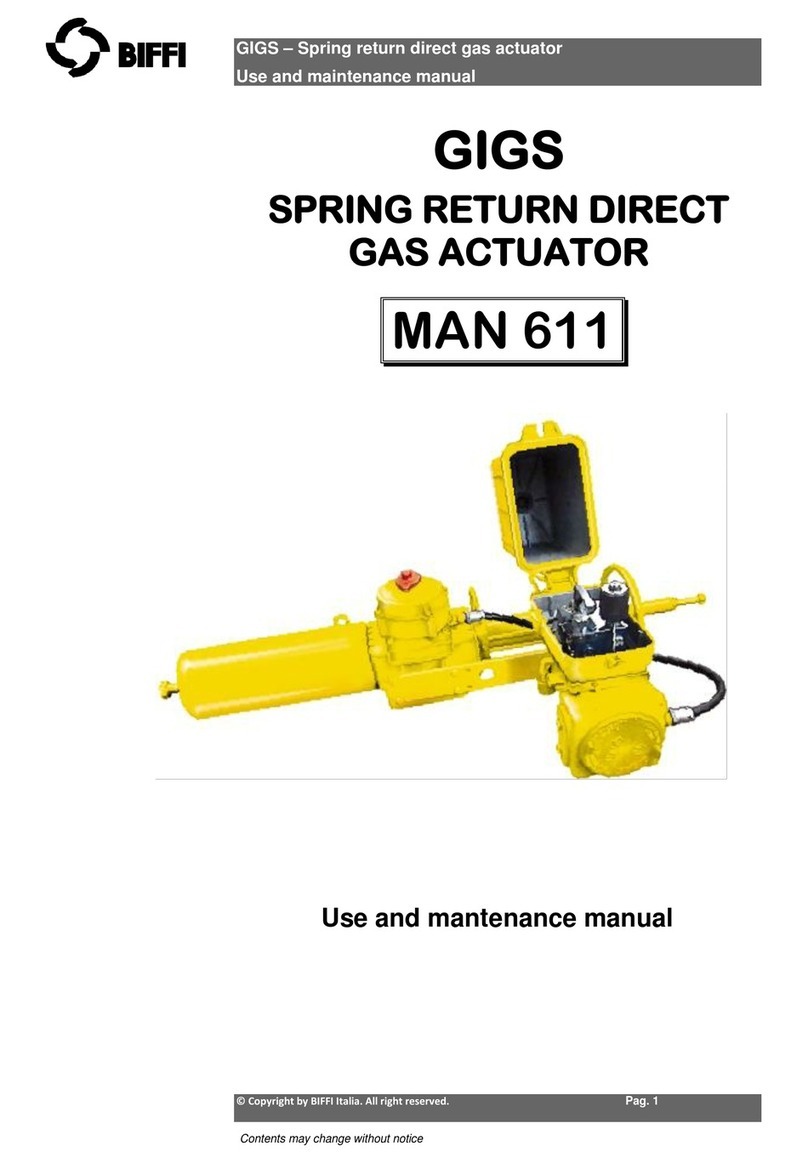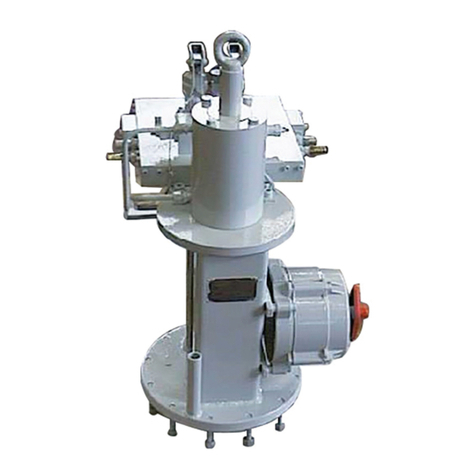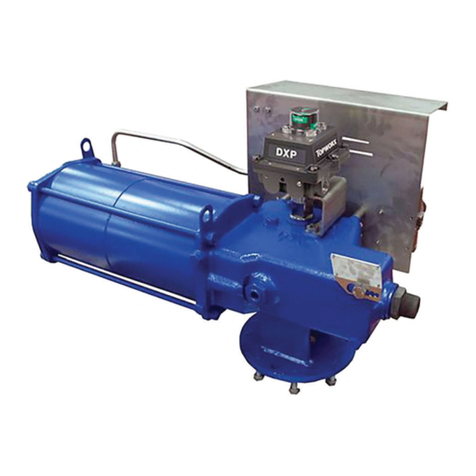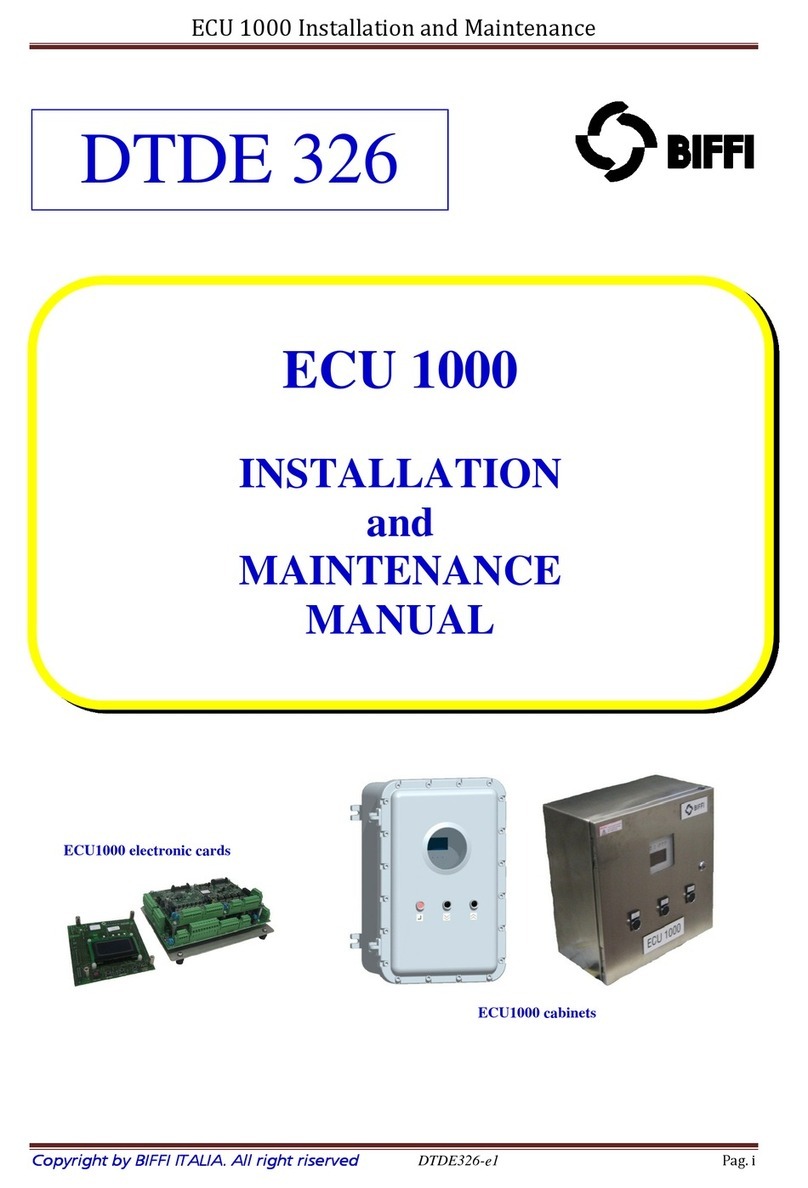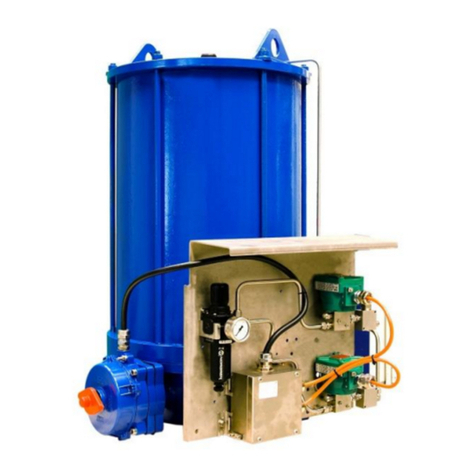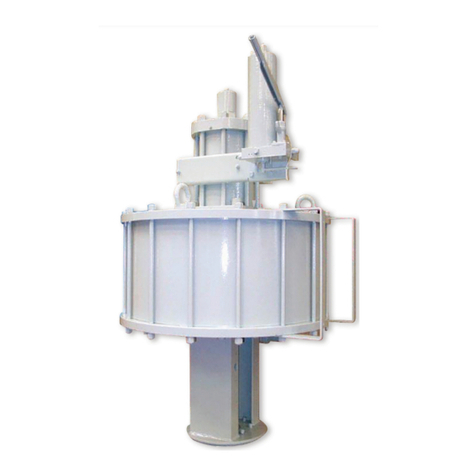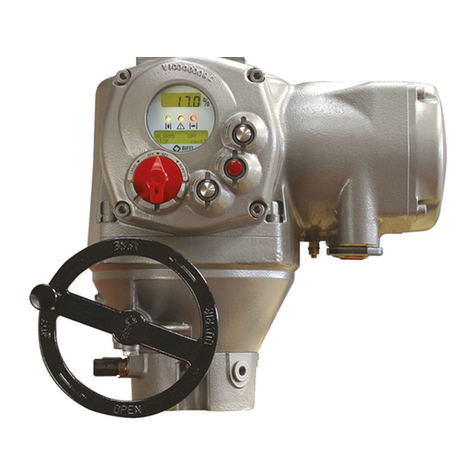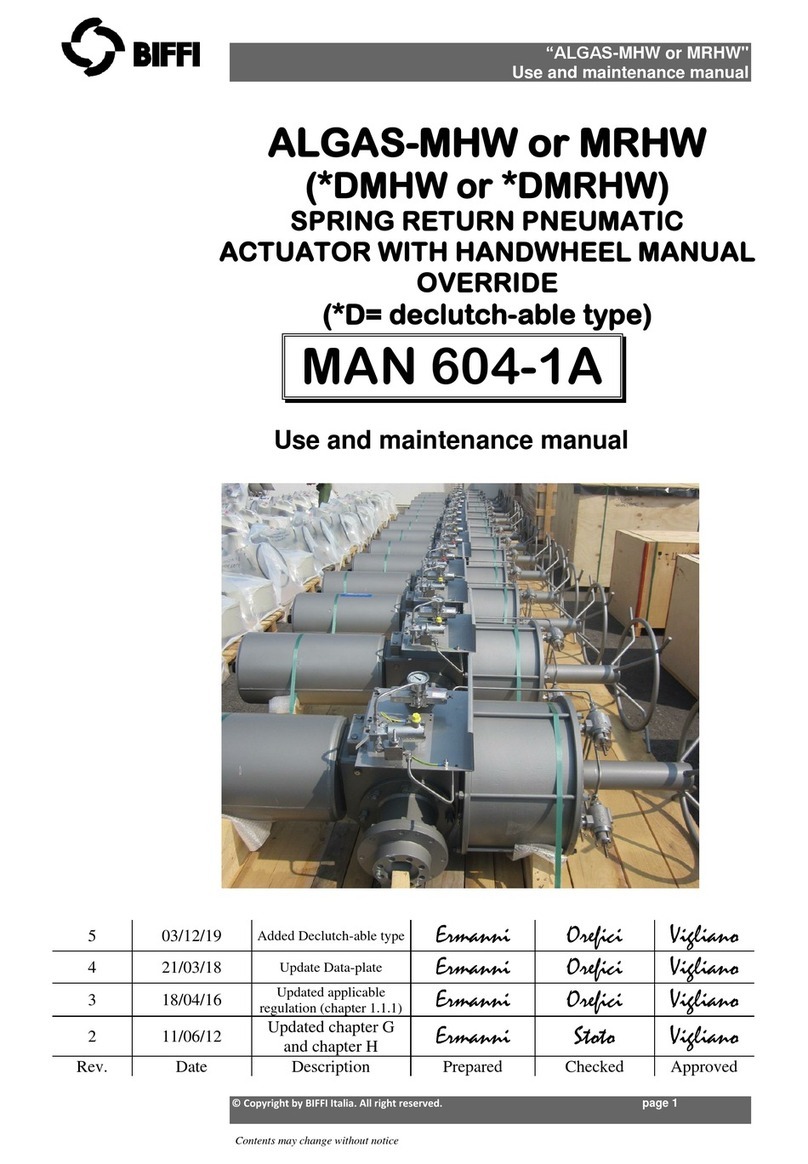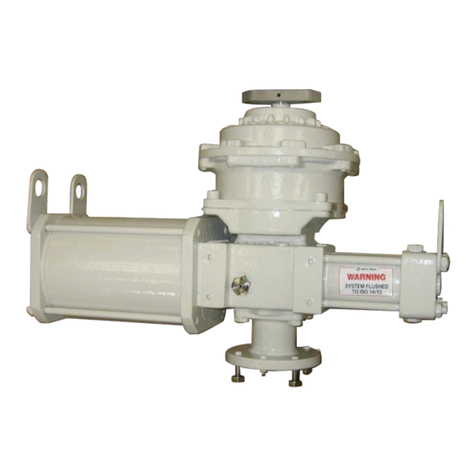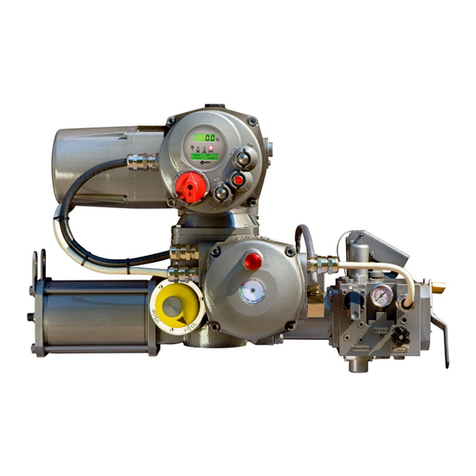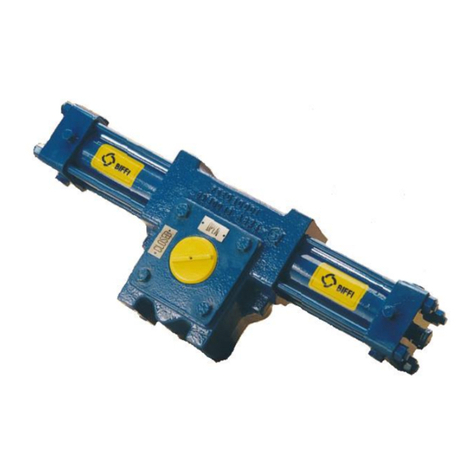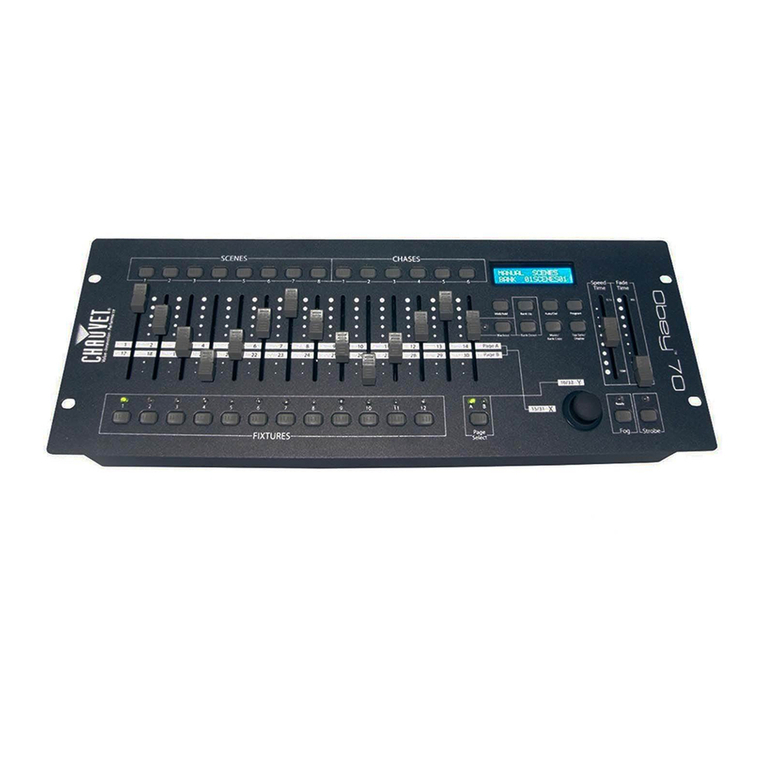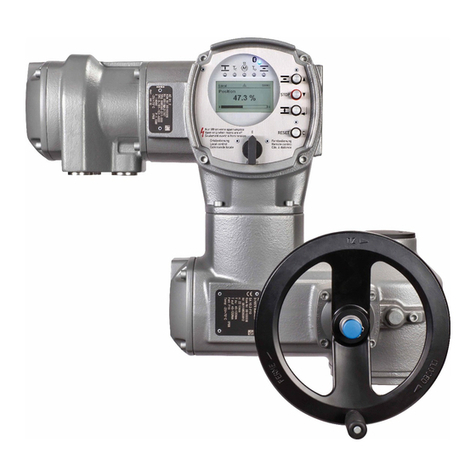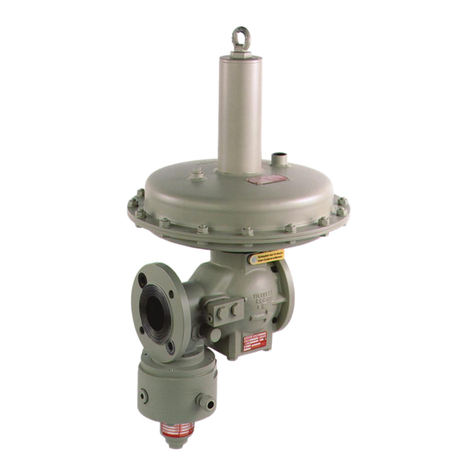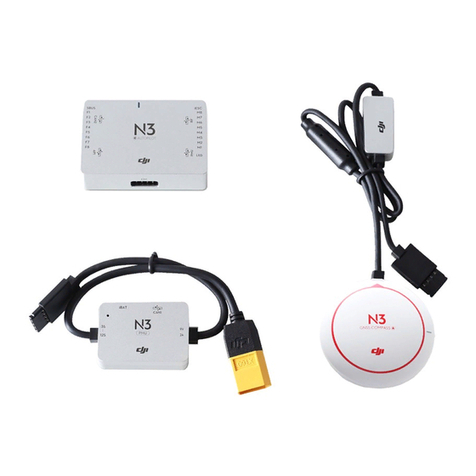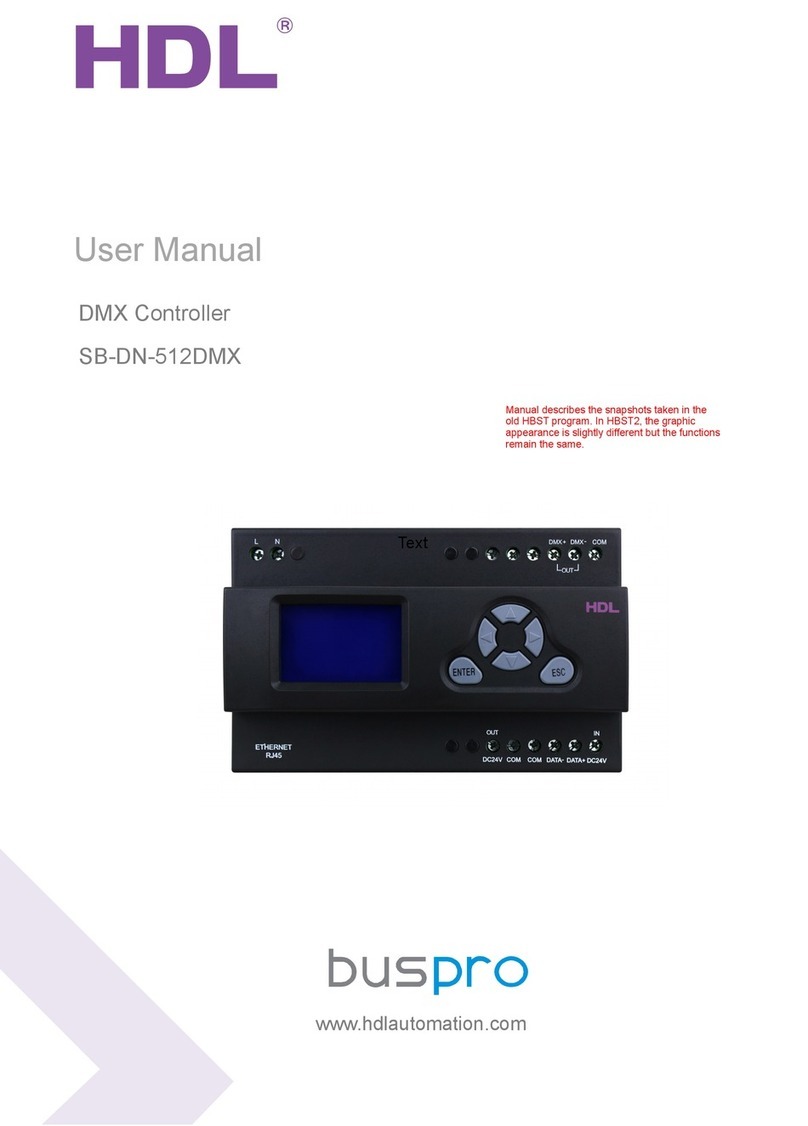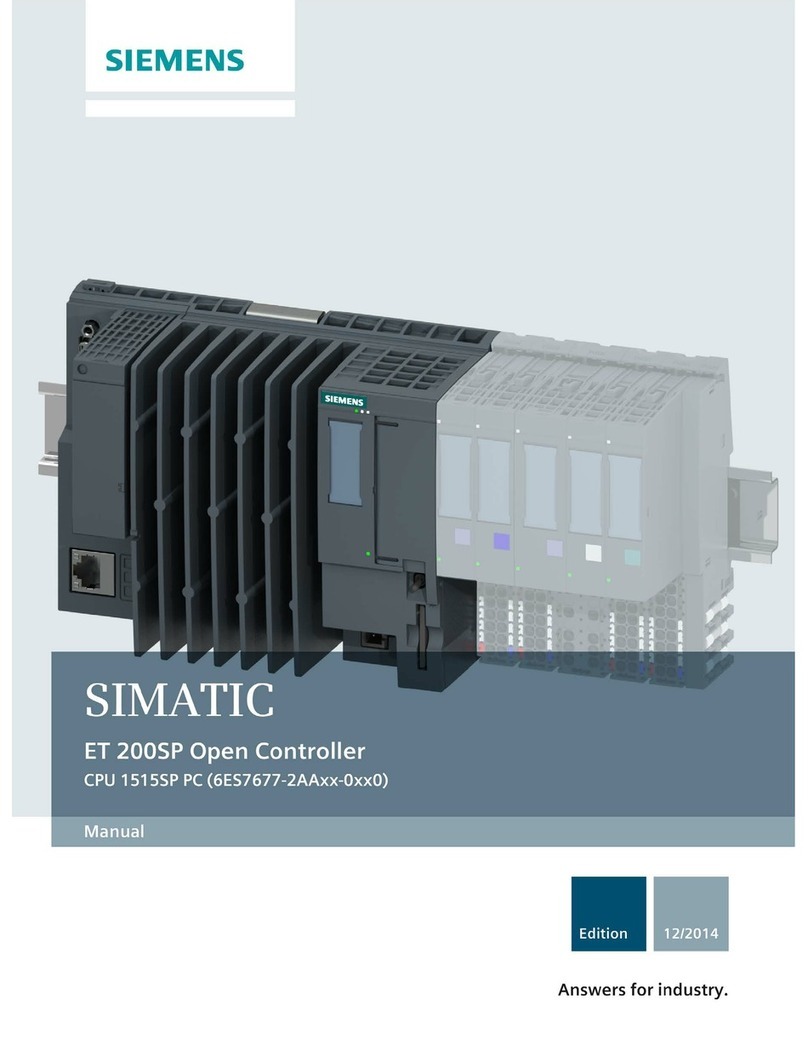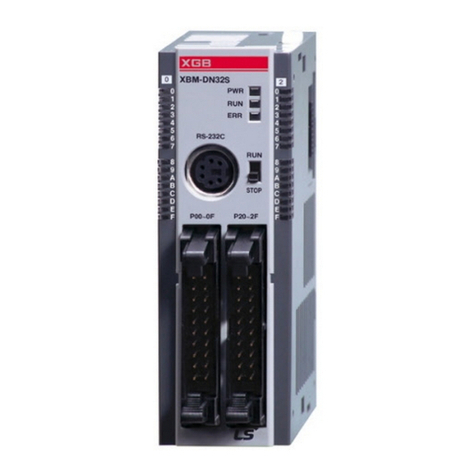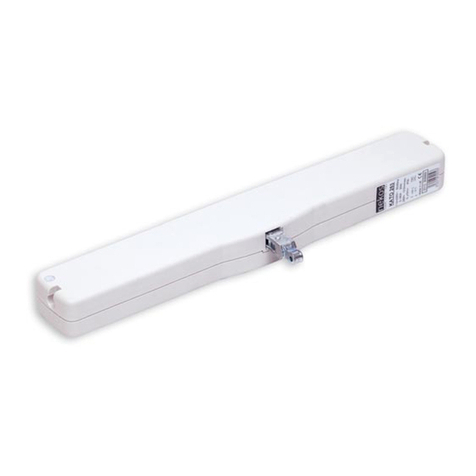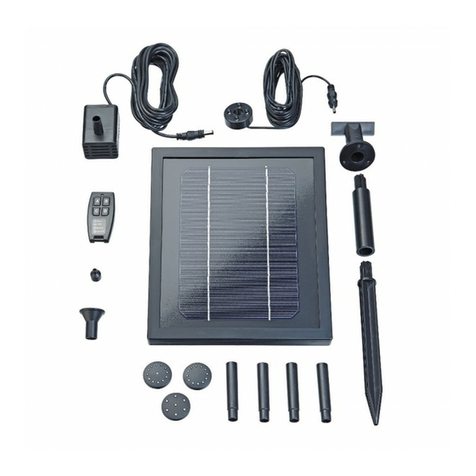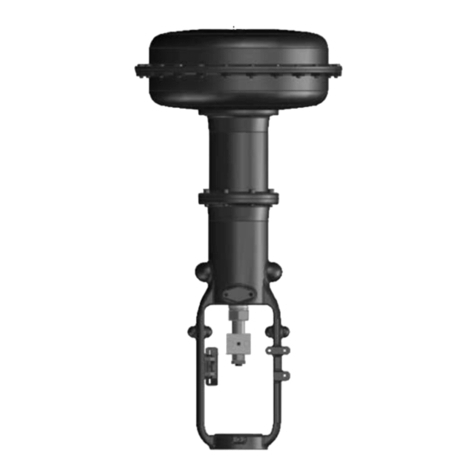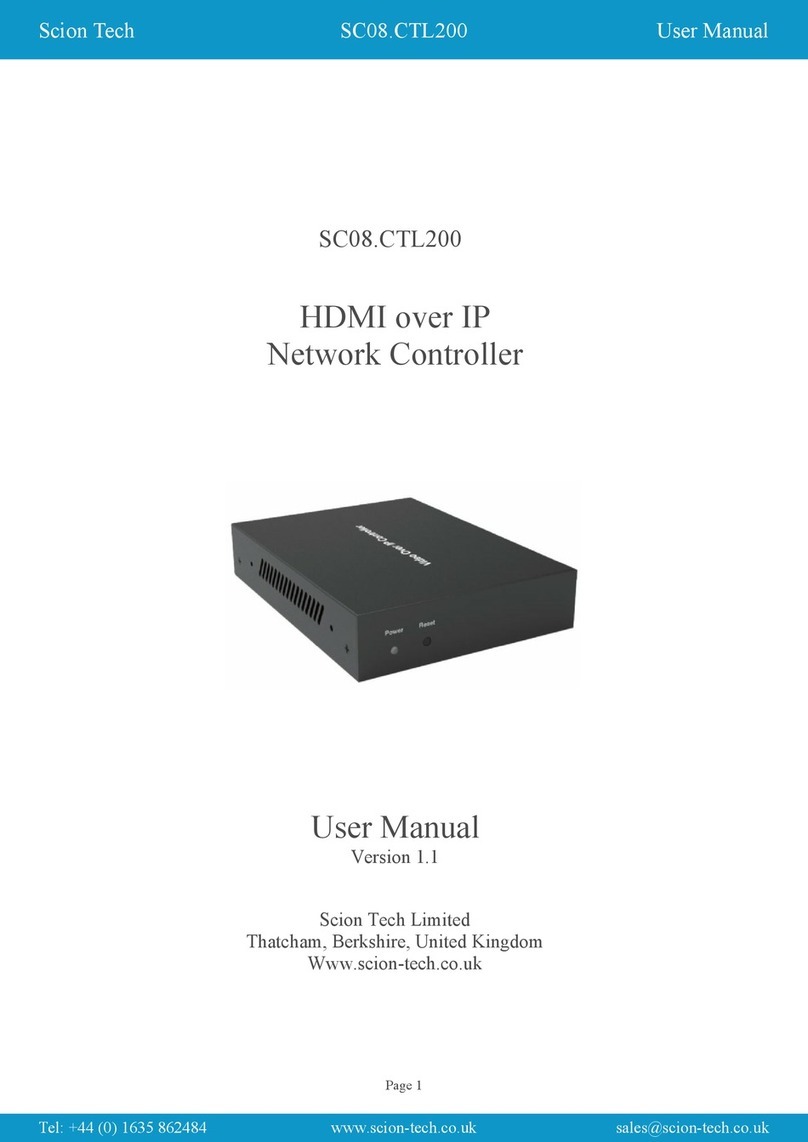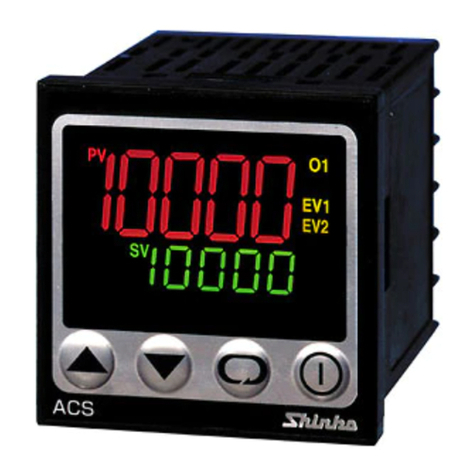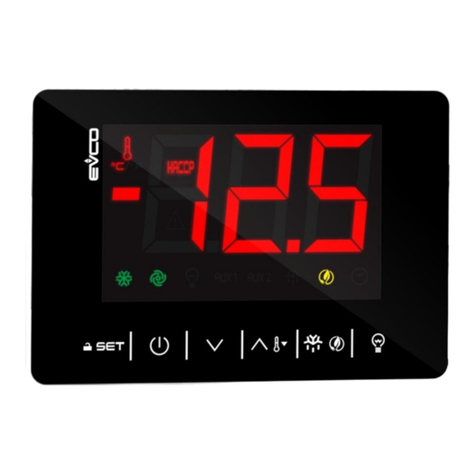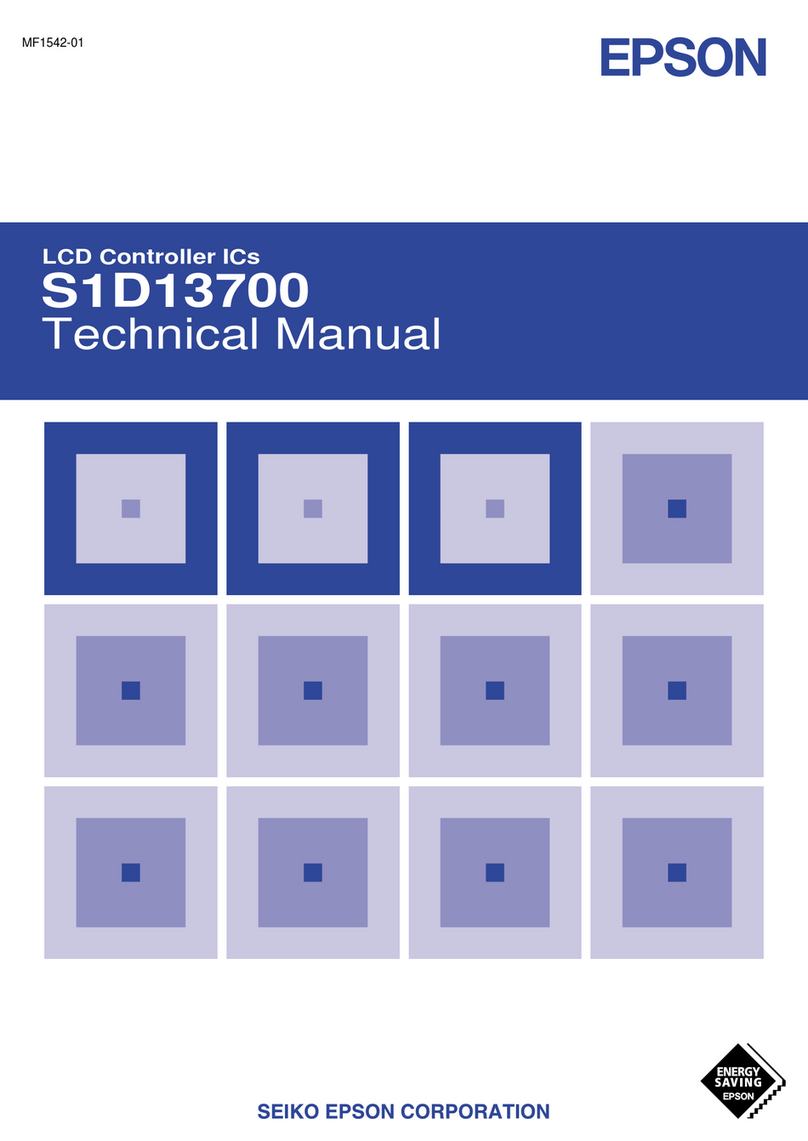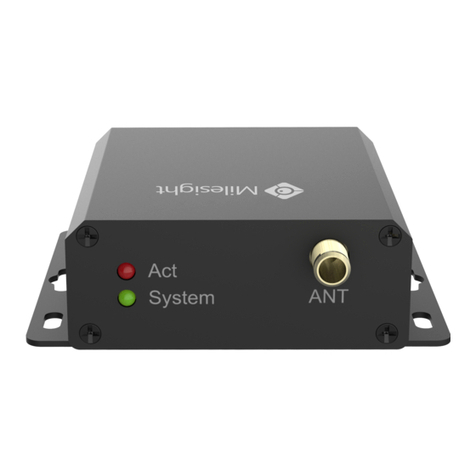BIFFI GIG User manual

Installation, Operation and Maintenance Manual
MAN 601 Rev. 7
December 2020
Bif GIG
Double-Acting Direct Gas Actuator
Copyright © Bif. The information in this document is subject to change without notice. Updated data sheets can be obtained from our website www.bif.it or from your nearest Bif Center:
Bif Italia s.r.l. - Strada Bif 165, 29017 Fiorenzuola d'Arda (PC) – Italy PH: +39 0523 944 411 – bif_italia@bif.it

Revision Details
December 2020
Installation, Operation and Maintenance Manual
MAN 601 Rev. 7
Revision Details
Revision Details
Revision Date Description Prepared Checked Approved
7 December 2020 Migration to new template
6 April 2018 Updated Data-plate Ermanni Oreci Vigliano
5April 2016 Updated applicable regulation (chapter 1.1.1) Ermanni Oreci Vigliano
4 August 2015 Updated chapters 3.3.3 and 3.3.4 Ermanni Oreci Vigliano
3February 2013 Updated chapter 5.1.1 Ermanni Oreci Vigliano
2 July 2012 General update Ermanni Stoto Vigliano
1March 2009 General update Ermanni Stoto Vigliano
0May 1999 Document release Lazzarini Aliani Ziveri

i
Installation, Operation and Maintenance Manual
MAN 601 Rev. 7
Table of Contents
December 2020
Table of Contents
Section 1: General Warnings
1.1 Generalities................................................................................................... 1
1.1.1 Applicable Regulation ........................................................................ 1
1.1.2 Terms and Conditions......................................................................... 2
1.2 Identication Plate ........................................................................................ 2
1.3 Introducing the Actuator............................................................................... 3
1.4 Data Sheet .................................................................................................... 3
Section 2: Installation
2.1 Checks upon Actuator Receipt ...................................................................... 4
2.2 Actuator Handling......................................................................................... 4
2.3 Storage ......................................................................................................... 6
2.4 Actuator Assembly on the Valve.................................................................... 7
2.4.1 Types of Assembly.............................................................................. 7
2.4.2 Assembly Procedure......................................................................... 12
2.5 Pneumatic Connections .............................................................................. 13
2.6 Electrical Connections (If Any)..................................................................... 14
2.7 Commissioning........................................................................................... 15
Section 3: Operation and Use
3.1 Operation Description................................................................................. 16
3.2 Residual Risks.............................................................................................. 20
3.3 Operations.................................................................................................. 20
3.3.1 Local Pneumatic Operation .............................................................. 20
3.3.2 Electric Remote Control to Open and to Close .................................. 21
3.3.3 Emergency Manual Operation by MSJ / MHW ................................... 21
3.3.4 Emergency Manual Operation by MHP ............................................. 23
3.4 Calibration of the Angular Stroke ................................................................ 26
3.5 Calibration of Micro-switches (If Foreseen).................................................. 31
3.6 Calibration of the Operation Time............................................................... 32
Table of Contents

ii
Table of Contents
December 2020
Installation, Operation and Maintenance Manual
MAN 601 Rev. 7
Section 4: Operational Tests and Inspections
Operational Tests and Inspections..........................................................................34
Section 5: Maintenance
5.1 Periodic Maintenance.................................................................................. 35
5.1.1 Check and Restore Oil Level in the Hydraulic Manual Override .......... 36
5.2 Extraordinary Maintenance ......................................................................... 39
5.2.1 Replacement of Cylinder Seals .......................................................... 39
5.3 Dismantling and Demolition ....................................................................... 43
5.4 Lubrication of Mechanism........................................................................... 44
Section 6: Troubleshooting
6.1 Failure or Breakdown Research.................................................................... 45
Section 7: Layouts
7.1 Spare Parts Order........................................................................................ 46
7.2 Parts List for Maintenance and Replacing Procedure.................................... 47
Section 8: Date Report for Maintenance Operations
Date Report for Maintenance Operations...............................................................54
Table of Contents

Installation, Operation and Maintenance Manual
MAN 601 Rev. 7 December 2020
General Warnings 1
Section 1: General Warnings
Section 1: General Warnings
NOTICE
The manual is an integral part of the machine, it should be carefully read before carrying
out any operation and it should be kept for future references.
1.1 Generalities
Bif Italia s.r.l. actuators are conceived, manufactured and controlled according to the Quality
Control System in compliance with EN ISO 9001 international regulation.
1.1.1 Applicable Regulation
EN ISO 12100:2010: Safety of machinery – General principles for design –
Risk assessment and risk reduction
2006/42/EC: Machine directive
2014/68/EU: Directive for pressure PED equipment
2014/35/EU: Directive for low voltage equipment
2014/30/EU: Directive for the electromagnetic compatibility
2014/34/EU: Directive and safety instructions for use in hazardous area
NOTICE
Bif Italia s.r.l. pays the highest attention to collecting and verifying the documentation
contained in this user manual. However Bif Italia s.r.l. is not liable for any mistakes
contained in this manual, for damage or accidents due to the use of the latter. The
information contained is of exclusive reserved ownership of Bif Italia s.r.l. and may be
modied without prior notice. All rights reserved.

December 2020
Installation, Operation and Maintenance Manual
MAN 601 Rev. 7
General Warnings2
Section 1: General Warnings
1.1.2 Terms and Conditions
Bif Italia s.r.l. guarantees that all the items produced are free of defects in workmanship
and manufacturing materials and meet relevant current specications, provided they
are installed, used and serviced according to the instructions contained in the present
manual. The warranty can last either one year from the date of installation by the initial
user of the product, or eighteen months from the date of shipment to the initial user,
depending on which event occurs rst. All detailed warranty conditions are specied in the
documentation forwarded together with the product. This warranty does not cover special
products or components not warranted by subcontractors, or materials that were used or
installed improperly or were modied or repaired by unauthorized staff. In the event that
a fault condition be caused by improper installation, maintenance or use, or by irregular
working conditions, the repairs will be charged according to applicable fees.
The warranty and Bif Italia s.r.l. liability shall lapse in the event that any modication
or tampering whatsoever be performed on the actuator.
1.2 Identication Plate
! WARNING
It is forbidden to modify the information and the marks without previous written
authorization by Bif Italia s.r.l.
The plate fastened on the actuator contains the following information (Figure1).
Figure 1 Data plate

Installation, Operation and Maintenance Manual
MAN 601 Rev. 7 December 2020
General Warnings 3
Section 1: General Warnings
1.3 Introducing the Actuator
The direct gas actuator GIG was engineered and is manufactured to provide fail safe
operation for any quarter turn application such as ball, plug, buttery valves or dampers,
in both ON-OFF and Modulating heavy duty service.
The actuator (see Figure 2) is made up of a weatherproof scotch yoke mechanism
transforming the linear movement of the pneumatic cylinder (on closing or opening) into
the rotary movement, which is necessary for operation. The angular stroke of the yoke is
adjustable between 82° and 98° by means of the external mechanical stops screwed into
the left wall of the mechanism housing and into the end ange of the pneumatic cylinder.
The cover of the scotch yoke mechanism is arranged for the assembly of the required
accessories (positioner, signalling limit switches, position transducer, etc.) by means of
proper matching units. The above mentioned accessories are operated by the actuator
drive sleeve. The housing of the scotch yoke mechanism has a ange with threaded holes
to x the actuator to the valve either directly or, if required, with the interposition of an
adaptor ange or a mounting bracket. The actuator yoke has a hole with keyways suitable
for the assembly of an insert bush the internal hole of which is machined (by Bif or at
Customer's care), according to the shape and dimensions of the valve stem. Bif can supply
different types of control system following Customer's requirements.
The expected lifetime of actuator is approximately 25 years .
Supply uid Sweet, dry natural gas; sour high pressure gas; nitrogen or
instrument air
Operating temperature Standard: from –30 °C to +100 °C
Optional: from –60 °C to +140 °C
Supply pressure Please refer to technical document: “actuator data-sheet”
Figure 2 Identication of actuator parts
Manual handpump
MHP (optional)
Pneumatic cylinder
Valve position indicator
Valve Coupling
Scotch yoke
mechanism
1.4 Data Sheet
Hydraulic Cylinder
for GIG-MHP models or
second pneumatic cylinder
for “twin gas cylinder”
models (optional)

December 2020
Installation, Operation and Maintenance Manual
MAN 601 Rev. 7
Installation
4
Section 2: Installation
Section 2: Installation
2.1 Checks upon Actuator Receipt
• Check that the model, the serial number of the actuator and the technical data
reported on the identication plate correspond with those of order conrmation,
see Section 1.2.
• Check that the actuator is equipped with the ttings as provided for by
order conrmation.
• Check that the actuator was not damaged during transportation: if necessary,
renovate the painting according to the specication reported on the
order conrmation.
• If the actuator is received already assembled with the valve, its settings have
already been made at the factory.
• If the actuator is delivered separately from the valve, it is necessary to check,
and if required, to adjust the settings of the mechanical stops (Section 3.4) and of
micro-switches (if any) (Section 3.5).
2.2 Actuator Handling
NOTICE
The lifting and handling of the actuator must be done by qualied personnel and in
accordance with the laws and regulations in force. Avoid the lifted actuator to be hung
above the personnel.
! WARNING
The actuator must be lifted by means of a suitable lifting apparatus. The weight of the
actuators is indicated in the technical documentation attached to the equipment itself.
For lifting and moving the actuator, use only hooks tted with safety latch, like the one,
for example, shown in Figure 3.
Figure 3 Example of hook with safety latch

Installation, Operation and Maintenance Manual
MAN 601 Rev. 7 December 2020
Installation 5
Section 2: Installation
Figure 4 Lifting points for GIG / GIG-MHP / GIG-MSJ / GIG-MHW actuators
1-2 = Lifting points (obligatory)
3= Balancing point
! WARNING
3 = don’t lay the actuator on tie rods of cylinder/s and don’t lay the actuator on accessories
(manual handpump, manual jackscrew, pneumatic control group etc.).
• For lifting unbalanced loads, use ropes of different lengths or chains with
adjustable length.
• Check each time the conditions of all lifting equipment used and discard it if
not in perfect working order.
• Do not knot or twist the ropes so as not to reduce the lifting capacity or
produce torsional effects on the load being lifted.
• Use the utmost caution and remain at a safe distance from lifted actuator
unless absolutely necessary; do not stand or pass under suspended loads.
• Pay attention in putting under tension the ropes to prevent the load shifting
sideways in an uncontrolled manner.
• Use slings of such length that the angles of the leg from vertical are as narrow
as possible (αMAX < 20°).
• During handling, do not transport the suspended actuator above staff
members in charge of the operation.
! WARNING
Do not use the lifting eyelets on actuator to lift valve + actuator assembly.
1= point of support
2= supports for lateral positioning

December 2020
Installation, Operation and Maintenance Manual
MAN 601 Rev. 7
Installation
6
Section 2: Installation
2.3 Storage
If the actuator needs storage, before installation follow these steps:
• Place it on a wood surface in order not to deteriorate the area of valve coupling.
• Make sure that plastic plugs are present on the pneumatic and electrical
connections (if present).
• Check that the cover of the control group and of the limit switch box (if any) are
properly closed.
If the storage is long-term or outdoor:
• Keep the actuator protected from direct weather conditions.
• Replace plastic plugs of pneumatic and electrical connections (if any) with metal
plugs that guarantee perfect tightness.
• Coat with oil, grease or protection disc, the valve coupling area.
• Periodically operate the actuator (Section 3.3).
Figure 5
LIFTING LUGS TO BE USED FOR THE
ACTUATOR ONLY. DO NOT LIFT VALVE
AND ACTUATOR TOGETHER
DO NOT DISASSEMBLE TOP OR
BOTTOM COVER.
SPRING LOADED.
POTENTIAL ELECTROSTATIC CHARGE HAZARD
BIFFI IS NOT LIABLE FOR ANY
PERSONNEL INJURY DUE TO
INCORRECT USE
REFER TO IOM

Installation, Operation and Maintenance Manual
MAN 601 Rev. 7 December 2020
Installation 7
Section 2: Installation
2.4 Actuator Assembly on the Valve
2.4.1 Types of Assembly
For coupling to the valve, the housing is provided with a ange with threaded holes
according to Bif standard tables (SCN6200; SCN6201;SCN6201-1). The number,
dimensions and diameter of the holes are made in accordance with ISO 5211, but for
actuator models 0.3 to 6 the holes are drilled on the centreline in order to allow an
easier assembly of an intermediate ange, when required. This intermediate ange
(or spool-piece ) can be supplied when the valve ange can not directly match the
actuator ange in its “standard” conguration.
For the biggest actuator models, the actuator ange can be machined in accordance
with the valve ange dimensions.
The yoke has bored with keyways for coupling to the valve stem, the dimensions of
which are according to Bif standard tables SCN6200 and SCN6201.

0.3 240 93 165 M20 4 5 17 127 70 12 75.6
0.9 310 112 254 M16 8 5 19 150 86 14 93.6
1.5 360 144 298 M20 8 6 19 190 112 18 119.0
3430 195 356 M30 8 923 200 157 25 167.8
6520 250 406 M36 8 14 29 260 200 28 212.8
December 2020
Installation, Operation and Maintenance Manual
MAN 601 Rev. 7
Installation
45°
Ø d2
+0.1
Ø d3
±0.2
Ø d1
0
h1
+0.5
Ø d4
h2
Ød5
+0.2
+0.1
K+
0.4
0
W D10
0
8
Section 2: Installation
Dimensions in millimeters
Actuator model Ø d1Ø d2Ø d3Ø d4N h1h2H max Ø d5WK
Table 1. SCN6200
Figure 6 Coupling dimensions - Models 0.3 to 6
Drive sleeve
N. threaded holes
PCD, number and size
according to ISO 5211
(but the holes are on
centerline instead of
straddle the centerline)
Flow line
Top view of the Scotch yoke mechanism
(actuator shown in closed position)
N.4 holes flange N.8 holes flange
max
H max

14 580 250 483 M36 12 10 29 340 175 45 195.8
18 680 290 603 M36 16 12 32 350 200 45 220.8
32 780 290 603 M36 16 12 32 400 220 50 242.8
35 780 315 603 M36 16 11 32 400 240 50 242.8
42 840 310 603 M36 16 12 32 400 220 50 242.8
Installation, Operation and Maintenance Manual
MAN 601 Rev. 7 December 2020
Installation
Ø d1
Ø d4
h2
Ø d2+0.1
0
Ø d3±0.2
h1 +0.5
0
Ø d5+0.2
+0.1
K+0.4
0
WD10
9
Section 2: Installation
Figure 7 Coupling dimensions - Models 14 to 42
N.12 holes flangeN.16 holes flange
max
Table 2. SCN6201
Dimensions in millimeters
Actuator model Ø d1Ø d2Ø d3Ø d4N h1h2H max Ø d5WK
Top view of the scotch yoke mechanism
(actuator shown in closed position)
Flow line
N. THREADED HOLES
PCD, number and
size according to ISO 5211
H max
Drive sleeve

50 800 315 698 M36 24 10 32 430 240 56 264.8
60 840 315 698 M36 24 10 32 430 240 56 264.8
December 2020
Installation, Operation and Maintenance Manual
MAN 601 Rev. 7
Installation
Ø d1
Ø d4
h2
Ø d2+0.1
0
Ø d3±0.2
h1 +0.5
0
Ø d5+0.2
+0.1
K+0.4
0
WD10
10
Section 2: Installation
Figure 8 Coupling dimensions - Models 50 and 60
Dimensions in millimetersw
Actuator model Ø d1Ø d2Ø d3Ø d4N h1h2H max Ø d5WK
max
Table 3. SCN6201-1
Top view of the scotch yoke mechanism
(actuator shown in closed position)
Flow line
N. THREADED HOLES
Flange sizing according to ISO
Drive sleeve
H max

Installation, Operation and Maintenance Manual
MAN 601 Rev. 7 December 2020
Installation 11
Section 2: Installation
Figure 9 Insert bush + intermediate coupling ange
Drive sleeve
Adaptor ange
Drive sleeve
The Bif insert bush with 2 external keys at 45° allows to position the keyway for the valve
every 90°. Consequently actuator can be mounted in 4 positions at 90° on top of the valve.
For biggest actuator models, the bore of the yoke can be machined according to the
dimensions of valve stem.
Position 2 Position 3 Position 4
Rotate insert-bush 180° around
vertical-standard position (1)
Rotate insert-bush 180° around
axis A-A, from position (2)
Rotate insert-bush 180° around
axis A-A, from position (1)
Insert bush turned upside down
Table 4.
Position 2 Position 3 Position 4
Flow line
Insert bush
N.4 holes ange N.8 holes ange
Insert bush
Housing
Standard position 1
Snap ring
If required, for the standard models size 0.3 to 6, Bif can supply an insert bush with
unmachined bore in accordance with Bif standard table SCN6202 enclosed
(see following pages). On request the insert bush bore can be machined by Bif to couple
the valve stem. The particular execution of the ange and bushing allow the actuator to be
rotated by 90° in 4 different positions according to the Figure 9.

December 2020
Installation, Operation and Maintenance Manual
MAN 601 Rev. 7
Installation
12
Section 2: Installation
2.4.2 Assembly Procedure
NOTICE
Failure to comply with the following procedures may impair product warranty.
! WARNING
Installation, commissioning and maintenance, and repair works should be carried out by
qualied staff. A non-conforming assembly could be the source of serious accidents.
For actuator assembly on the valve:
NOTICE
Check that the assembly position, as shown on the documentation, complies with system’s
geometry. Check the consistency of the parts of actuator-valve coupling.
• Operate the actuator so that it reaches the matching valve position (Section 3.3).
• Lubricate valve stem with oil or grease.
• Properly clean and remove grease from valve coupling ange surfaces.
• Connect, if supplied separately, the adjustment insert to valve stem and fasten it
with the special fastening pins.
• Lift the actuator using the special lifting points (Section 2.2).
• Install the actuator so that valve stem inserts in the coupling area. This coupling
should be made without forcing.
• Fasten the two parts with the threaded connections (screws, tie rods, nuts).
If holes of coupling anges are not aligned, adequately operate the actuator if
necessary move the mechanical stops backwards (Section 3.4).
• Fasten threaded connections. Please refer to Table 5.

M8 20
M10 40
M12 70
M14 110
M16 160
M20 320
M22 420
M24 550
M27 800
M30 1100
M33 1400
M36 1700
Installation, Operation and Maintenance Manual
MAN 601 Rev. 7 December 2020
Installation 13
Section 2: Installation
Threading Tightening torque (Nm)
The screwing values in Table 5 were calculated considering the materials ASTM A320 L7
for screws or tie rods and ASTM A194 gr.2H for the nuts.
2.5 Pneumatic Connections
! WARNING
Check that the values of hydraulic supply available are compatible with those reported on
the identication plate of the actuator.
NOTICE
The connections should be made by qualied staff. Use pipes, ttings and connections
appropriate as for type, material and dimensions.
• Properly deburr the ends of rigid pipes.
• Properly clean the interior of pipes sending through them plenty of the supply uid
used in the system.
• Mould and fasten the connection pipes so that no irregular strains at entries or
loosening of threaded connections occur.
• Make the connections according to the operating diagram.
• Check the absence of leakages from pneumatic connections.
NOTICE
If necessary to mount components not in Bif scope of supply, please check the accessories
mounting hole details in the documents TN 1028 (for metric dimension) or TN 1028U
(for imperial dimension).
Table 5. Nuts tightening torque

December 2020
Installation, Operation and Maintenance Manual
MAN 601 Rev. 7
Installation
14
Section 2: Installation
2.6 Electrical Connections (If Any)
! WARNING
Use components appropriate as for type, material and dimensions. The connections should
be made by qualied staff . Before carrying out any operation, cut line power off.
Safety provisions:
2006/95/EC: Directive for low voltage equipment (until 19 April 2016)
2014/35/EU from 20 April 2016
2004/108/EC: Directive for the electromagnetic compatibility (until19 April 2016)
2014/30/EU from 20 April 2016
94/9/CE: Directive and safety instructions for use in hazardous Area
(until 19 April 2016) 2014/34/EU from 20 April 2016
Remove plastic plugs from cables entries:
• Screw rmly the cable glands.
• Introduce connection cables.
• Make the connections in compliance with applicable wiring diagrams on the
documentation supplied.
• Screw the cable gland.
• Replace the plastic plugs of unused entries with metal plugs.
Ground
Figure 10 Junction box on control group (if foreseen)

Installation, Operation and Maintenance Manual
MAN 601 Rev. 7 December 2020
Installation 15
Section 2: Installation
2.7 Commissioning
! WARNING
Check that values of electrical supply to the control group (if foreseen) are compatible
with those on the plate on the junction box (Figure 10). Installation, commissioning and
maintenance, and repair works should be made by qualied staff.
Upon actuator commissioning, please carry out the following checks:
• Check that paint is not be damaged during transport, if necessary repair the
damages to paint coat.
• Check that the pressure and quality of the gas supply (ltering degree, dehydration)
are as prescribed. Check that the feed voltage values of the electric components
(solenoid valve coils, micro-switches, pressure switches, etc.) are compatible
with those reported on the identication plate of the actuator (Figure 1).
• Check that the setting of the components of the actuator control unit (pressure
regulator, pressure switches, ow control valves, etc.) meet the plant requirements.
• Carry out all kinds of operations and check their proper execution (Section 3.3).
• Check the absence of leakages in the pneumatic connections. If necessary, tighten
the nuts of the pipe-ttings.
• Check proper operation of all the due signalling (valve position, gas supply
pressure etc.)
• Make a complete functional test in order to verify all the operations are executed
according to operating schematic diagram supplied.

December 2020
Installation, Operation and Maintenance Manual
MAN 601 Rev. 7
Operation and Use16
Section 3: Operation and Use
Section 3: Operation and Use
3.1 Operation Description
In the normal operating situation, the direct gas actuator is fed by pressurised gas which
ows into the relevant cylinder chamber (for example opening). The cylinder piston stroke
causes the actuator operation and the consequent valve movement to the operational
position requested (in this case to the “open” position).
Upon a demand, the closing chamber the cylinder is fed by pressurised gas and at the
same time the gas is discharged from the open chamber into the return line: the actuator
performs the closing operation driven by the piston movement, and the valve moves from
the open position to the close (safety-related) position.
For local or remote operations, please refer to Sections 3.3.1, 3.3.2 , 3.3.3 and 3.3.4 and
prior to technical documentation furnished with actuators. Typical schematics for various
applications are follow attached for information only: in these schematics, actuator
operation speed (see Section 3.5) is adjustable by bidirectional ow regulators (item 276)
for GIG and GIG with manual jackscrew or handwheel (refer to follow GIG-1 typical control
schematic); for models with manual handpump, speed is adjusted by unidirectional ow
regulators (item Fa – Fc) placed on manual override body (refer to following GIG-2 and
GIG-3 schematics).
The power and control systems are supplied on specic customer demand.
! WARNING
For all the relevant information, please refer to the specic documentation supplied.
PNEUMATIC CONNECTION
Figure 11
This manual suits for next models
3
Table of contents
Other BIFFI Controllers manuals
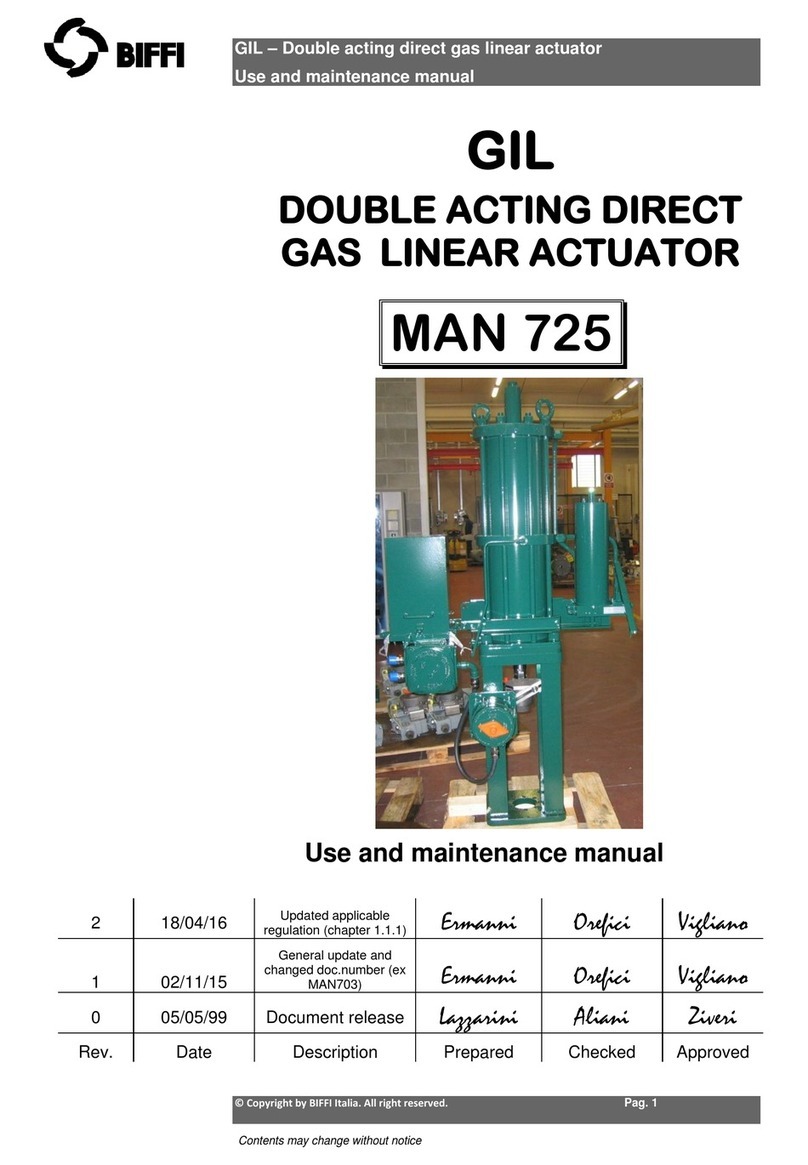
BIFFI
BIFFI GIL MAN 725 User manual
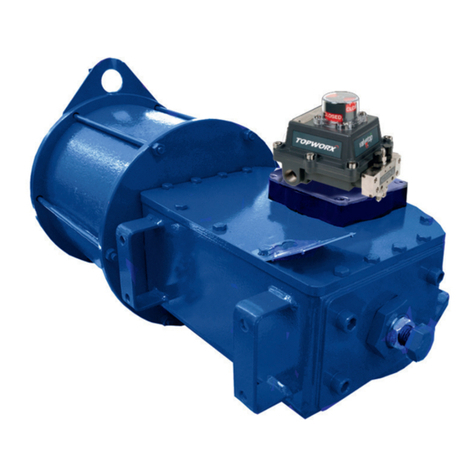
BIFFI
BIFFI ALGA Series User manual
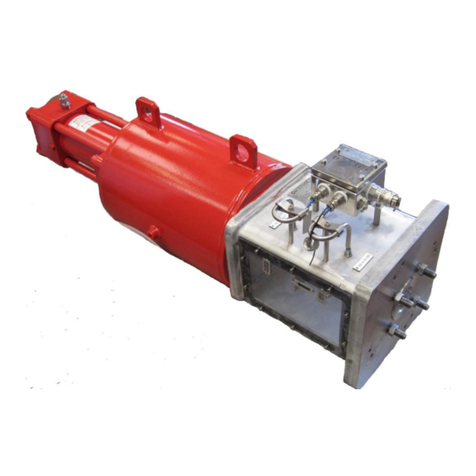
BIFFI
BIFFI HLAS User manual
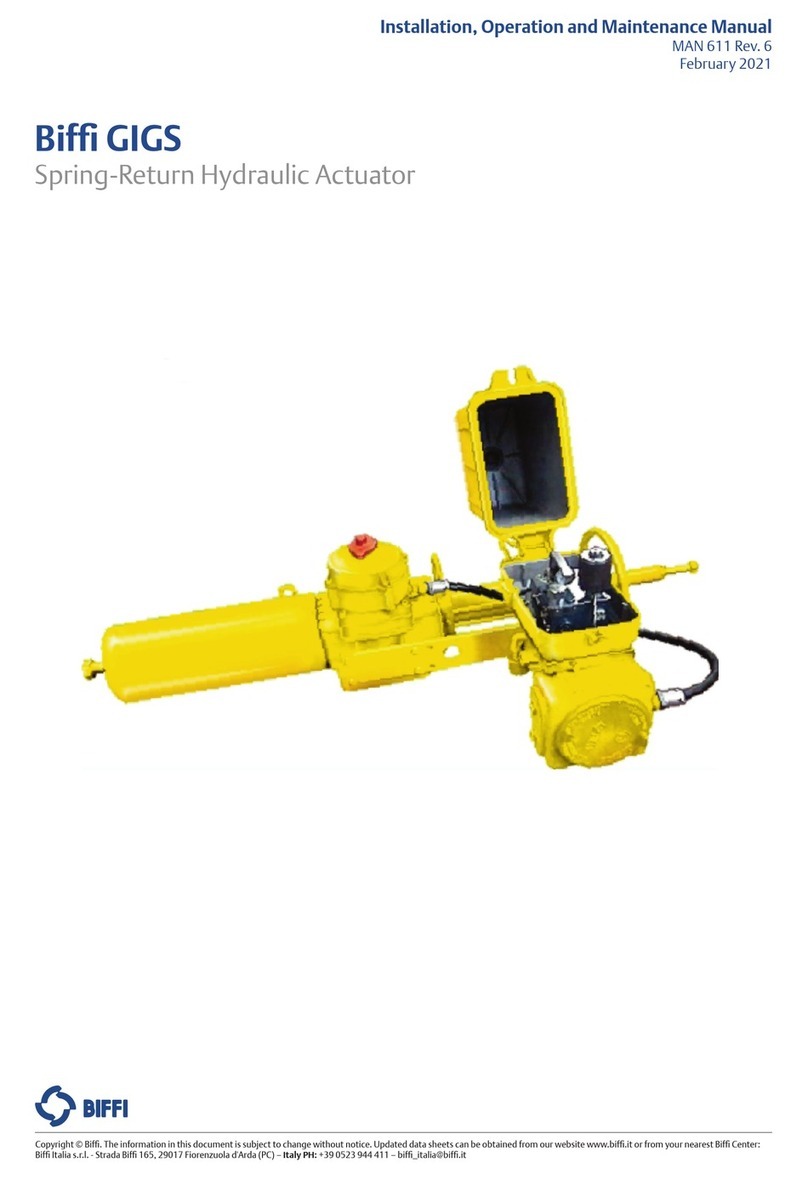
BIFFI
BIFFI GIGS Series User manual
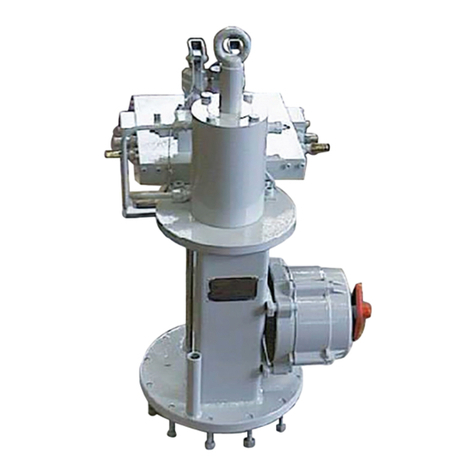
BIFFI
BIFFI HLA Series User manual
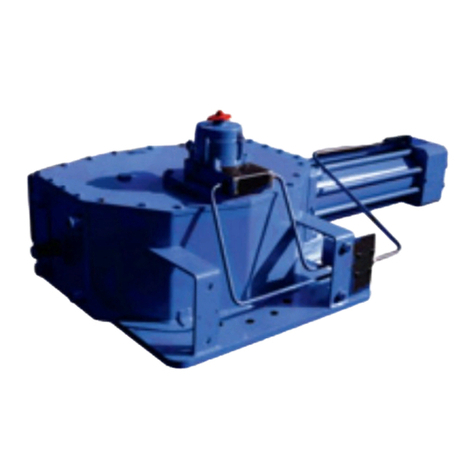
BIFFI
BIFFI OLGA-H User manual
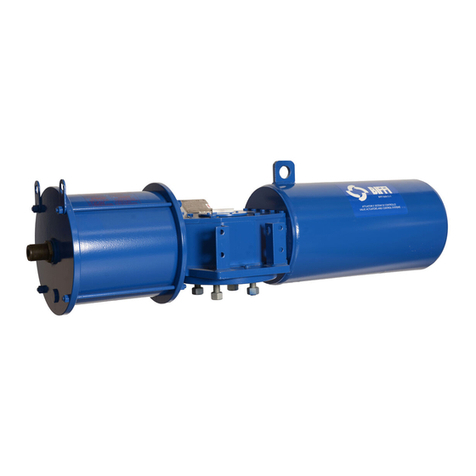
BIFFI
BIFFI ALGAS User manual
BIFFI
BIFFI ICON3000 Series User manual
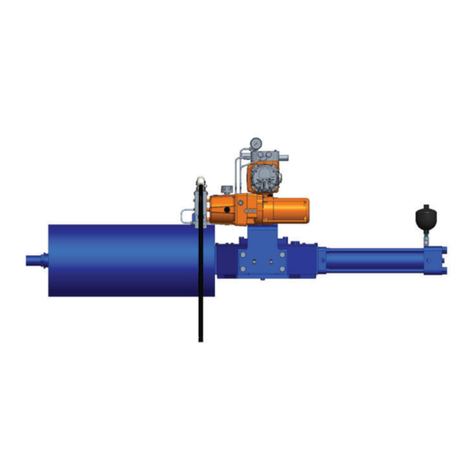
BIFFI
BIFFI EHO User manual
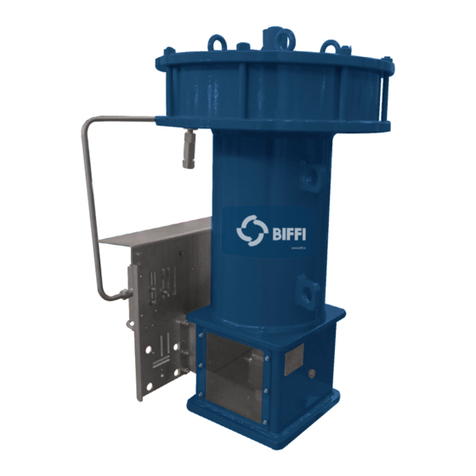
BIFFI
BIFFI PLAS Series User manual
